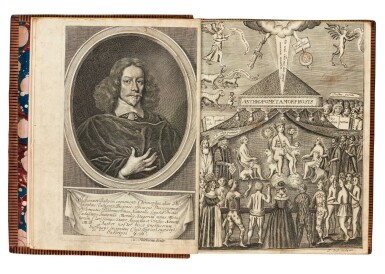Books and Manuscripts, Medieval to Modern
Books and Manuscripts, Medieval to Modern

Fine books and manuscripts from a private Scottish library
John Bulwer | Anthropometamorphosis: man transform'd: or, the artificiall changling, 1653
Lot Closed
December 13, 02:10 PM GMT
Estimate
1,000 - 1,500 GBP
Lot Details
Description
John Bulwer
Anthropometamorphosis: man transform'd: or, the artificiall changling. London: William Hunt, 1653
Second much enlarged edition, small 4to (181 x 135mm.), engraved frontispiece portrait by William Fairthorne, engraved additional title by T. Cross, woodcut head-pieces and initials, woodcut illustrations throughout text, unsigned leaf bound after S2 with woodcut illustrations on both sides, late nineteenth-century calf by Andrew Grieve, spine with raised bands in six compartments, green label, all edges yellow, engraved additional title closely shaved at top edge, leaves lightly toned, some light spotting
An extraordinary work on the semiotics of the human body by the medical practitioner and writer on deafness and gesture John Bulwer, whose long neglect as a serious and pioneering thinker only began to be rectified at the end of the twentieth century. One of four books he wrote on the theme of the human body as a medium of communication, Anthropometamorphosis surveys the "artificial deformations of the body practised by various people from head to toe" (Graham Richards, ODNB), i.e. body modifications, with accompanying woodcuts in this, the expanded second edition (the work first appeared in 1650).
The moral agenda is uppermost in this work, with a pronounced emphasis on the natural as morally superior to the artificial. Circumcision, both in the male and female forms, for instance, is heavily inveighed against. "Bulwer took Francis Bacon's plea for a 'science of man', as well as his inductive method, more literally than any other seventeenth-century savant... his works more nearly approach modern psychology in character than those of illustrious philosophical contemporaries" (op.cit.).
LITERATURE:
ESTC R202040
